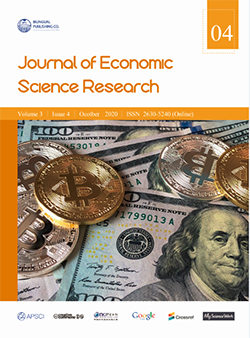Predicting on Chinese Consumers’ Organic Wine Purchase Intention
DOI:
https://doi.org/10.30564/jesr.v3i4.2267Abstract
There is very little research on the perception and willingness of Chinese consumers to purchase organic wine.The research aims to understand the factors which influence Chinese consumers’ willingness on organic wine purchase. Based on the TRA and TPB, combine with SCT, a conceptual model is established to solve research problems.
Keywords:
Chinese consumer; Organic wine; Purchase intention; TRA; TPB; SCTReferences
[1] Eastman, J.K., R.E. Goldsmith, L.R. Flynn. Status Consumption in Consumer Behavior: Scale Development and Validation. Journal of Marketing Theory and Practice, 1999, 7: 41-52.
[2] Groening, C., Sarkis, J., Zhu, Q. Green marketing consumer-level theory review: a compendium of applied theories and further research directions. Journal of Cleaner Production, 2018, 172(2): 1848-1866.
[3] Lea, E., Worsley, T. Australians’ organic food beliefs, demographics and values. British Food Journal, 2005, 107(10): 855-869.
[4] McCarthy, B., Liu, H.B., Chen, T. Innovations in the agro-food system: adoption of certified organic food and green food by Chinese consumers. British Food Journal, 2016, 118(6): 1334-1349.
[5] Mei, O.J., Ling, K.C., Piew, T.H. The antecedents of green purchase intention among Malaysian consumers. Asian Social Science, Organic Trade Association, 2012, 8(13): 248-263. Available at: www.ota.com/resources/market-analysis
[6] Rana, J., Paul, J. Consumer behavior and purchase intention for organic food: a review and research agenda. Journal of Retailing and Consumer Services, 2017, 38: 157-165.
[7] Thøgersen, J., de Barcellos, M.D., Perin, M.G., Zhou, Y. Consumer buying motives and attitudes towards organic food in two emerging markets: China and Brazil. International Marketing Review, 2015, 32(3/4): 389-413
[8] Zhang, K.Z., Benyoucef, M. Consumer behavior in social commerce: a literature review. Decision Support Systems, 2016, 86(1): 95-108.
Downloads
Issue
Article Type
License
Copyright and Licensing
The authors shall retain the copyright of their work but allow the Publisher to publish, copy, distribute, and convey the work.
Journal of Economic Science Research publishes accepted manuscripts under Creative Commons Attribution-NonCommercial 4.0 International License (CC BY-NC 4.0). Authors who submit their papers for publication by Journal of Economic Science Research agree to have the CC BY-NC 4.0 license applied to their work, and that anyone is allowed to reuse the article or part of it free of charge for non-commercial use. As long as you follow the license terms and original source is properly cited, anyone may copy, redistribute the material in any medium or format, remix, transform, and build upon the material.
License Policy for Reuse of Third-Party Materials
If a manuscript submitted to the journal contains the materials which are held in copyright by a third-party, authors are responsible for obtaining permissions from the copyright holder to reuse or republish any previously published figures, illustrations, charts, tables, photographs, and text excerpts, etc. When submitting a manuscript, official written proof of permission must be provided and clearly stated in the cover letter.
The editorial office of the journal has the right to reject/retract articles that reuse third-party materials without permission.
Journal Policies on Data Sharing
We encourage authors to share articles published in our journal to other data platforms, but only if it is noted that it has been published in this journal.




 Xueying Liu
Xueying Liu

